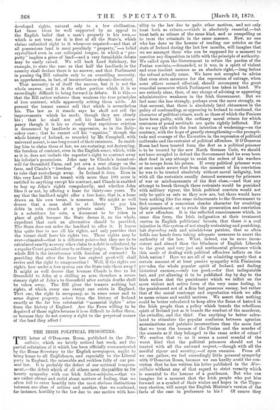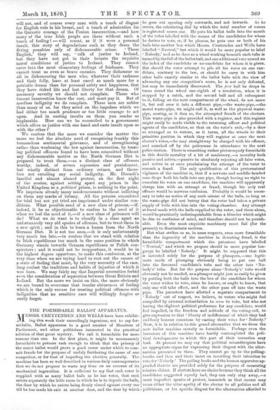THE IRISH POLITICAL PRISONERS.
TEIE letter of O'Donovan Rossa, published in the Mar- seillaise, which we briefly noticed last week, and the partial refutation of it which has been officially communicated by the Home Secretary to the English newspapers, ought to bring home to all Englishmen, and especially to the Liberal party in England, the miserable and reckless folly of our pre- sent law. It is probably the defect of our national tempera- ment,—the defect which of all others most disqualifies us for hearty sympathy with our Irish fellow-subjects,—that we are rather obtuse and stolid about matters of feeling, that we often fail to enter heartily into the most obvious distinctions between one class of actions and another, that we confound, for instance, hostility to the law due to one motive with hos- tility to the law due to quite other motives, and not only treat both as crimes,—which is absolutely essential,—but treat both as crimes of the same kind, and as compelling us to treat the criminals in the same manner. Now, no one who has done us the honour of reading our articles on the state of Ireland during the last few months, will imagine that we are amongst those who can be supposed for a moment to sanction any disposition to trifle with the principle of authority. We called upon the Government to refuse the pardon of the Fenian convicts,—demanded, as it was, in a spirit of violent and even insolent menace as an absolute right,—long before the refusal actually came. We have not scrupled to advise that even stern measures for the repression of outrage, when none others seemed effectual, should accompany the great remedial measures which Parliament has taken in hand. We are entirely clear, then, of any charge of advising or approving administrative weakness in the Irish Government. But we feel none the less strongly, perhaps even the more strongly, on that account, that there is absolutely fatal obtuseness in the policy of confounding. or appearing to Ireland to confound, the character of political crimes, such as those of which the Fenians have been guilty, with the ordinary moral crimes for which sentences of penal servitude are quite rightly inflicted. Nor do we say this with the least intention of weakening—on the contrary, with the hope of greatly strengthening—the prompti- tude and courage of the Executive in the repression of political outbreaks and the restraint of political offenders. If O'Donovan Rossa had been treated from the first as a political prisoner is to be treated by the new North German Code, we should not have scrupled to defend the Government had he even been shot dead in any attempt to resist the orders of his warders or to escape from his prison. If every political prisoner were at once made aware that from the moment of his conviction he was to be treated absolutely without moral indignity, but with all the restraints usually deemed necessary for prisoners of war or misdemeanants of the first class,—and that any attempt to break through these restraints would be punished with military rigour, the Irish political convicts would not only be quite as safe as they now are, but there would have been nothing like the same inducements to the Government to find excuses of a somewhat slender character for remitting their punishment, or to evade the prosecution and conviction of new offenders. It is the reflected consciousness which, in some dim form, the Irish indignation at their treatment excites in English politicians' breasts, that there is a real injustice in this system of not simply restraining and punishing, but degrading rash and mischievous patriots, that so often holds our hands from taking adequate measures to assert the authority of the law. What, indeed, can be more incon- sistent and absurd than the blindness of English Liberals to the great and very just and sentimental grievance which this mode of dealing with political offenders inflicts on the Irish nation ? Here we are all of us admitting openly that a certain amount of at least passive sympathy with Fenianism per7ades the whole popular spirit of Ireland, and finding historical excuses,—only too good,—for that indisputable fact, and yet allowing it to be published day by day to the Irish nation that the punishment which we inflict on the more violent and active form of the very same feeling, is the punishment not of a firm but generous enemy, but rather that of the moral contempt and reprobation which we affix to mean crimes and sordid motives. We assert that nothing could be better calculated to keep alive the flame of hatred in the Irish people than a policy which brands the rebellious spirit of Ireland just as it brands the conduct of the murderer, the swindler, and the thief. Can anything be better calcu- lated to stimulate the popular confusion between agrarian assassinations and patriotic insurrections than the mere fact that we treat the treason of the Fenian and the murder of the assassin as if they belonged to the same order of crime ? We confess that to us it seems a moral scandal of the worst kind that the political prisoners should not be treated with all the outward respect,—though with all the needful rigour and severity,—of open enemies. From all we can gather, we feel exceedingly little personal sympathy with O'Donovan Rossa, because we can hardly avoid the con- viction that he has written his letter published in the Mar- seillaise without Any of that regard to strict veracity which is essential to the honour of a gentleman. But who can imagine for a moment that the Irish people who put him forward as a symbol of their wishes and hopes in the Tippe- rary election, will accept the English Minister's version of the
facts of the case in preference to his ? Of course they will not, and of course every man with a touch of disgust for English rule in his breast, and a touch of admiration for the Quixotic courage of the Fenian insurrection,—and how many of the true Irish people are there without such a touch of feeling ? — will resent, as if it were a personal insult, this story of degradations such as they deem the fitting penalties only of dishonourable crime. These English,' they will say, talk of justice to Ireland, but they have not got in their breasts the requisite moral conditions of justice to Ireland. They cannot enter into the most elementary feelings of Irishmen. They cannot treat us even as brave enemies. They dishonour us all in dishonouring the men who, whatever their rashness and their folly, have at least cared so much more for a patriotic dream than for personal safety and happiness, that they have risked life and lost liberty for that dream. Of necessary severity we should not complain. Those who foment insurrection know the cost, and must pay it. But of needless indignity we do complain. These men are nobler than many of us, for they acted on the impulses which we had either too much prudence or too little courage to act upon. And in casting insults on them you render us implacable. How can we be reconciled to a government which offers us justice with one hand and casts insult upon us with the other ?'
We confess that the more we consider the matter the more we feel the absolute need of recognizing frankly this tremendous sentimental grievance, and of strengthening rather than weakening the law against insurrection, by treat- ing political offences found to have been committed without any dishonourable motive as the North German Diet is prepared to treat them,—as a distinct class of offences worthy, indeed, of severe repression and punishment, but wholly distinct from ordinary crimes, and there- fore not entailing any social indignity. Mr. Disraeli's fanciful and almost absurd protest, on the first night of the session, against setting apart any prison in the United Kingdom as a political prison, is nothing to the point. We imprison already many misdemeanants without inflicting on them any marks of infamy. All the persons committed for trial but not yet tried are imprisoned under similar con- ditions. What possible need of a new class of prisons,—if, indeed, it be so objectionable to confess to the need of it when we feel the need of it,—if a new class of prisoners will do ? What we do want is to classify in a class apart an unfortunately very old species of offences, but to treat them in a new spirit ; and in this to learn a lesson from the North German Diet. It is not too soon,—it is only unfortunately very much too late,—to confess that we stand with relation to Irish republicans too much in the same position in which Germany stands towards German republicans or Polish con- spirators; and it would not be inopportune, it would be in the highest degree opportune, to make this confession, at the very time when we are trying hard to root out the causes of a state of feeling that must, by the very necessity of the case, long outlast the traditions and habits of injustice of which it was born. We may fairly say that Imperial necessities forbid even the consideration of separation between Great Britain and Ireland. But the more we insist on this, the more obviously we are bound to overcome that insular obtuseness of feeling which is the only excuse for treating political offences with indignities that no sensitive race will willingly forgive or easily forget.









































 Previous page
Previous page